| Listing 1 - 10 of 207 | << page >> |
Sort by
|
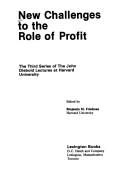
ISBN: 0669021717 9780669021714 Year: 1978 Publisher: Lexington, Mass. Lexington Books
Abstract | Keywords | Export | Availability | Bookmark
 Loading...
Loading...Choose an application
- Reference Manager
- EndNote
- RefWorks (Direct export to RefWorks)
Economic order --- Profit
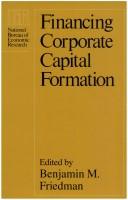
ISBN: 0226263401 9780226263403 Year: 1982 Publisher: Chicago, Ill. University of Chicago Press
Abstract | Keywords | Export | Availability | Bookmark
 Loading...
Loading...Choose an application
- Reference Manager
- EndNote
- RefWorks (Direct export to RefWorks)
Money market. Capital market --- United States --- Saving and investment --- Capital market --- Corporations --- Congresses. --- Finance --- -Corporations --- -Saving and investment --- -#ECO:03.09:industrie en onderneming investering FDI financiering --- Accumulation, Capital --- Capital accumulation --- Capital formation --- Investment and saving --- Saving and thrift --- Capital --- Supply-side economics --- Wealth --- Investments --- Business corporations --- C corporations --- Corporations, Business --- Corporations, Public --- Limited companies --- Publicly held corporations --- Publicly traded corporations --- Public limited companies --- Stock corporations --- Subchapter C corporations --- Business enterprises --- Corporate power --- Disincorporation --- Stocks --- Trusts, Industrial --- Capital markets --- Market, Capital --- Financial institutions --- Loans --- Money market --- Securities --- Crowding out (Economics) --- Efficient market theory --- Congresses --- -Congresses --- #ECO:03.09:industrie en onderneming investering FDI financiering --- Finance&delete& --- Geldmarkt. Kapitaalmarkt --- Verenigde Staten van Amerika --- Saving and investment - United States - Congresses. --- Capital market - United States - Congresses. --- Corporations - United States - Finance - Congresses. --- United States of America
Book
ISBN: 0720433002 0720433169 0444105891 9780720433166 Year: 1975 Volume: v. 17 Publisher: Amsterdam North-Holland
Abstract | Keywords | Export | Availability | Bookmark
 Loading...
Loading...Choose an application
- Reference Manager
- EndNote
- RefWorks (Direct export to RefWorks)
Business cycles --- #TWER:BOEK --- 519.85 --- Mathematical programming --- Linear programming. --- Quadratic programming. --- 519.85 Mathematical programming --- Linear Programming --- Quadratic Programming --- Linear programming --- Quadratic programming --- Programmation linéaire --- Programmation quadratique --- Commande, Théorie de la
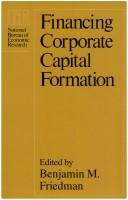
ISBN: 0226264114 9786612189234 1282189239 0226264238 9780226264233 9780226264110 Year: 1985 Publisher: Chicago
Abstract | Keywords | Export | Availability | Bookmark
 Loading...
Loading...Choose an application
- Reference Manager
- EndNote
- RefWorks (Direct export to RefWorks)
The research reported in this volume represents the second stage of a wide-ranging National Bureau of Economic Research effort to investigate "The Changing Role of Debt and Equity in Financing U.S. Capital Formation." The first group of studies sponsored under this project, which have been published individually and summarized in a 1982 volume bearing the same title (Friedman 1982), addressed several key issues relevant to corporate sector behavior along with such other aspects of the evolving financial underpinnings of U.S. capital formation as household saving incentives, international capital flows, and government debt management. In the project's second series of studies, presented at the National Bureau of Economic Research conference in January 1983 and published here for the first time along with commentaries from that conference, the central focus is the financial side of capital formation undertaken by the U.S. corporate business sector. At the same time, because corporations' securities must be held, a parallel focus is on the behavior of the markets that price these claims.
Capital structure --- United States --- Corporations --- Finance. --- -US / United States of America - USA - Verenigde Staten - Etats Unis --- 339.112.2 --- 658.40 --- 339.312.3 --- 658.41 --- 339.4 --- Business corporations --- C corporations --- Corporations, Business --- Corporations, Public --- Limited companies --- Publicly held corporations --- Publicly traded corporations --- Public limited companies --- Stock corporations --- Subchapter C corporations --- Business enterprises --- Corporate power --- Disincorporation --- Stocks --- Trusts, Industrial --- Finance --- Eigendom van roerende goederen. --- Financieel beheer van de bedrijven: algemeenheden. --- Financiering van de bedrijven. --- Herkomst van het kapitaal der bedrijven. --- Vermogensbeheer. Financiële analyse. Verspreiding van de beleggingsrisico's. --- E-books --- US / United States of America - USA - Verenigde Staten - Etats Unis --- Eigendom van roerende goederen --- Financiering van de bedrijven --- Vermogensbeheer. Financiële analyse. Verspreiding van de beleggingsrisico's --- Financieel beheer van de bedrijven: algemeenheden --- Herkomst van het kapitaal der bedrijven --- Corporations - United States - Finance. --- equity, finance, economics, capital formation, corporation, business, economy, securities, market, price, debt management, government, international, saving incentives, household, manufacturing, investment, inflation, bonds, portfolio, substitution, wealth, stockholders, corporate liabilities, valuation, contingent claims, leverage, nonfiction. --- United States of America
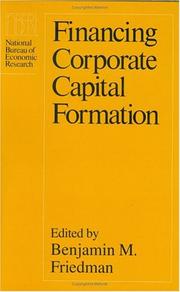
ISBN: 0226264130 9786611223472 1281223476 0226264246 9780226264240 9780226264134 Year: 1986 Publisher: Chicago
Abstract | Keywords | Export | Availability | Bookmark
 Loading...
Loading...Choose an application
- Reference Manager
- EndNote
- RefWorks (Direct export to RefWorks)
Six leading economists examine the financing of corporate capital formation in the U.S. economy. In clear and nontechnical terms, their papers provide valuable information for economists and nonspecialists interested in such questions as why interest rates are so high, why corporate debt has accelerated in recent years, and how government debt affects private financial markets. Addressing these questions, the contributors focus chiefly on three themes: the actual use of debt and equity financing by corporations in recent years; the factors that drive the financial markets' pricing of debt and equity securities; and the relationship between corporations' real investment decisions and their financial decisions. While some of the papers are primarily expository, others break new ground. Extending his previous work, Robert Taggart finds a closer relationship between corporate and government debt than has been supposed. Zvi Bodie, Alex Kane, and Robert McDonald conclude in their study that the volatility of interest rates under the Volcker regime has led to a rise in real interest rates because of investors' demand for a greater risk premium. All of the papers present empirical findings in a useful analytical framework. For its new findings and for its expert overview of issues central to an understanding of the U.S. economy, Financing Corporate Capital Formation should be of both historical and practical interest to students of economics and practitioners in the corporate and financial community.
Money market. Capital market --- Capital structure --- United States --- Corporations --- Saving and investment --- Capital --- Sociétés --- Epargne et investissement --- Finance --- Congresses --- Finances --- Congrès --- -Corporations --- -Saving and investment --- -US / United States of America - USA - Verenigde Staten - Etats Unis --- 336.214 --- 658.40 --- 339.312.3 --- 658.41 --- Papers presented at a conference held at Williamsburg, Va., September 20-21, 1984. --- NBB congres --- Accumulation, Capital --- Capital accumulation --- Capital formation --- Investment and saving --- Saving and thrift --- Supply-side economics --- Wealth --- Investments --- Business corporations --- C corporations --- Corporations, Business --- Corporations, Public --- Limited companies --- Publicly held corporations --- Publicly traded corporations --- Public limited companies --- Stock corporations --- Subchapter C corporations --- Business enterprises --- Corporate power --- Disincorporation --- Stocks --- Trusts, Industrial --- Capital assets --- Fixed assets --- Economics --- Capitalism --- Infrastructure (Economics) --- -Congresses --- Belastingstelsel van de genootschappen. --- Financieel beheer van de bedrijven: algemeenheden. --- Financiering van de bedrijven. --- Herkomst van het kapitaal der bedrijven. --- Sociétés --- Congrès --- Finance&delete& --- E-books --- Papers presented at a conference held at Williamsburg, Va., September 20-21, 1984 --- US / United States of America - USA - Verenigde Staten - Etats Unis --- Belastingstelsel van de genootschappen --- Financiering van de bedrijven --- Financieel beheer van de bedrijven: algemeenheden --- Herkomst van het kapitaal der bedrijven --- Corporations - United States - Finance - Congresses --- Saving and investment - United States - Congresses --- Capital - United States - Congresses --- corporate formation, corporations, economics, economists, finances, financing, united states of america, american society, economy, interest rates, debt, government debts, private financial markets, equity, pricing, investment decisions, volatility, risk, congress, politics, required returns, deficits, valuing flexibility, business. --- United States of America
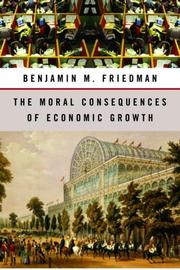
ISBN: 0679448918 9780679448914 Year: 2006 Publisher: New York, N.Y. Knopf
Abstract | Keywords | Export | Availability | Bookmark
 Loading...
Loading...Choose an application
- Reference Manager
- EndNote
- RefWorks (Direct export to RefWorks)
From the author of 'Day of Reckoning', the acclaimed critique of Ronald Reagan's economic policy (& Every citizen should read it,& said 'The New York Times'): a persuasive, wide-ranging argument that broadly distributed economic growth provides benefits far beyond the material, creating and strengthening democratic institutions, establishing political stability, fostering tolerance, and enhancing opportunity. & Are we right,& Benjamin M. Friedman asks, & to care so much about economic growth as we clearly do?& To answer, Friedman reaches beyond economics. He examines the political and social histories of the large Western democracies& particularly of the United States since the Civil War& distinguishing times of generally rising living standards from those of pervasive stagnation to illustrate how rising incomes render a society more open and democratic. He shows, too, how our attitudes toward economic growth and its consequences have roots in the thinking of prior centuries, especially the Enlightenment, and also include significant strands of religious influence. Friedman also delineates the role of economic growth in determining which developing nations extend the broadest freedoms to their citizenry. He makes clear that growth, rather than just the level of living standards, is key to effecting political and social liberalization in the third world. But he also warns that the democratic values of countries even as wealthy as our own are at risk whenever incomes stagnate for extended periods. Merely being rich is no protection against a society's retreat into rigidity and intolerance once enough of its citizens lose the sense that they are getting ahead. Finally, Friedman shows us why, if America is to strengthen democratic institutions around the world as a bulwark against terrorism and social unrest, we must aggressively pursue growth at home and promote worldwide economic expansion beyond what purely market-driven forces would create. And for the United
Economic growth --- Professional ethics. Deontology --- Democracy --- Economic development --- Income distribution --- Political participation --- 174 --- 331.04 --- 338.8 --- AA / International- internationaal --- US / United States of America - USA - Verenigde Staten - Etats Unis --- 174.5 --- 330.35 --- 330.56 --- Self-government --- Political science --- Equality --- Representative government and representation --- Republics --- Citizen participation --- Community action --- Community involvement --- Community participation --- Involvement, Community --- Mass political behavior --- Participation, Citizen --- Participation, Community --- Participation, Political --- Political activity --- Political behavior --- Political rights --- Social participation --- Political activists --- Politics, Practical --- 330.56 Nationaal inkomen. Volksinkomen. Gezinsinkomen. Vermogensstratificatie. Particuliere inkomens en bestedingen. Armoede. Honger --- Nationaal inkomen. Volksinkomen. Gezinsinkomen. Vermogensstratificatie. Particuliere inkomens en bestedingen. Armoede. Honger --- 174.5 Economische ethiek. Speculatie --- Economische ethiek. Speculatie --- 330.35 Economische groei. Kwantitatieve toename. Technische vooruitgang --zie ook {338.09} --- Economische groei. Kwantitatieve toename. Technische vooruitgang --zie ook {338.09} --- Distribution of income --- Income inequality --- Inequality of income --- Distribution (Economic theory) --- Disposable income --- Moral and ethical aspects --- Langdurige bewegingen --- Economische groei --- Moral and religious aspects --- Democracy. --- Income distribution. --- Political participation. --- Moral and ethical aspects. --- Economic development - Moral and ethical aspects --- Développement économique --- Changement social --- Mondialisation --- Démocratie --- États-Unis --- Aspect moral --- Aspect environnemental --- Europe --- Politique économique
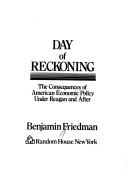
ISBN: 0394565533 9780394565538 Year: 1988 Publisher: New York Random House
Abstract | Keywords | Export | Availability | Bookmark
 Loading...
Loading...Choose an application
- Reference Manager
- EndNote
- RefWorks (Direct export to RefWorks)
Fiscal policy --- Debts, Public --- Loans, Foreign --- United States --- Economic conditions --- 330.48 --- 331.31 --- 333.846.0 --- 336.301 --- 336.311.2 --- 336.401 --- 336.61 --- US / United States of America - USA - Verenigde Staten - Etats Unis --- Foreign loans --- International loans --- Loans, International --- Loans --- Conditionality (International relations) --- Foreign loan insurance --- Neo-klassiekers en andere post-keynesiaanse theorieën. Public choice. Institutionalisten. Home economics. Analyseschool van de transactiekosten --- Economisch beleid --- Verband tussen het monetair, bank- en kredietbeleid en de economische ontwikkeling: algemeenheden --- Toestand, structuur, rentelast en evolutie van de rijksschuld --- Buitenlandse leningen van de overheid --- Verband tussen begrotingspolitiek en economische evolutie --- Financieel beleid --- Fiscal policy - United States. --- Debts, Public - United States. --- Loans, Foreign - United States. --- United States - Economic conditions - 1981 --- -Debts, Public
Book
ISBN: 9780593317983 059331798X 9780593317990 Year: 2021 Publisher: New York, N.Y. Alfred A. Knopf
Abstract | Keywords | Export | Availability | Bookmark
 Loading...
Loading...Choose an application
- Reference Manager
- EndNote
- RefWorks (Direct export to RefWorks)
"Where do our ideas about economics and economic policy come from? Critics of contemporary economics complain that belief in free markets, among economists and many ordinary citizens too, is a form of religion. It turns out that there is something to the idea: not in the way the critics mean, but in a deeper, more historically grounded sense. Contrary to the conventional historical view of economics as entirely a secular product of the Enlightenment, religion exerted a powerful influence from the outset. Benjamin M. Friedman demonstrates that the foundational transition in thinking about what we now call economics, beginning in the eighteenth century, was decisively shaped by the hotly contended lines of religious thought within the English-speaking Protestant world. Beliefs about God-given human character, about our destiny after this life, and about the purpose of our existence, were all under challenge in the world in which Adam Smith and his contemporaries lived. Those debates explain the puzzling behavior so many of our fellow citizens whose views about economic policies, and whose voting behavior too, seems sharply at odds with what would be to their own economic benefit. Understanding the origins of the relationship between religious thinking and economic thinking, together with its ongoing consequences, provides insights into our current economic policy debates and ways to shape more functional policies for all citizens"--
Economics --- Religious thought --- Capitalism --- Religion and capitalism --- Religion and economics --- Religious aspects --- History --- Sociology of religion --- Economic order --- E-books --- 241.65*5 --- 174.5 --- 241.67 --- 241.67 Business ethics. Corporate ethics. Bedrijfscodes. Management en ethiek. Zakenmoraal --- Business ethics. Corporate ethics. Bedrijfscodes. Management en ethiek. Zakenmoraal --- 174.5 Economische ethiek. Speculatie --- Economische ethiek. Speculatie --- 241.65*5 Theologische ethiek: private eigendom; diefstal; armoede --- Theologische ethiek: private eigendom; diefstal; armoede
Book
ISBN: 0593317998 Year: 2021 Publisher: New York, NY : Alfred A. Knopf,
Abstract | Keywords | Export | Availability | Bookmark
 Loading...
Loading...Choose an application
- Reference Manager
- EndNote
- RefWorks (Direct export to RefWorks)
"Where do our ideas about economics and economic policy come from? Critics of contemporary economics complain that belief in free markets, among economists and many ordinary citizens too, is a form of religion. It turns out that there is something to the idea: not in the way the critics mean, but in a deeper, more historically grounded sense. Contrary to the conventional historical view of economics as entirely a secular product of the Enlightenment, religion exerted a powerful influence from the outset. Benjamin M. Friedman demonstrates that the foundational transition in thinking about what we now call economics, beginning in the eighteenth century, was decisively shaped by the hotly contended lines of religious thought within the English-speaking Protestant world. Beliefs about God-given human character, about our destiny after this life, and about the purpose of our existence, were all under challenge in the world in which Adam Smith and his contemporaries lived. Those debates explain the puzzling behavior so many of our fellow citizens whose views about economic policies, and whose voting behavior too, seems sharply at odds with what would be to their own economic benefit. Understanding the origins of the relationship between religious thinking and economic thinking, together with its ongoing consequences, provides insights into our current economic policy debates and ways to shape more functional policies for all citizens"--
Economics--Religious aspects. --- Economics --- Religious thought --- Capitalism --- Religious aspects. --- History.
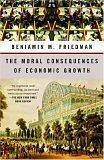
ISBN: 9781400095711 1400095719 Year: 2005 Publisher: New York : Vintage Books,
Abstract | Keywords | Export | Availability | Bookmark
 Loading...
Loading...Choose an application
- Reference Manager
- EndNote
- RefWorks (Direct export to RefWorks)
Economic development --- Income distribution. --- Political participation. --- Democracy. --- Développement économique --- Revenu --- Participation politique --- Démocratie --- Moral and ethical aspects. --- Aspect moral --- Répartition
| Listing 1 - 10 of 207 | << page >> |
Sort by
|

 Search
Search Feedback
Feedback About UniCat
About UniCat  Help
Help News
News